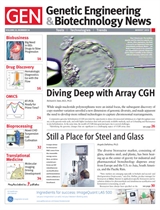Sep 10 2013
Bayer HealthCare and the Broad Institute are joining forces in the area of oncogenomics and drug discovery in a collaboration over a period of five years to discover and develop therapeutic agents that selectively target cancer genome alterations.
The pharmaceutical firm and the Cambridge, Massachusetts-based institute say they plan to base their collaboration on joint decision making, and the rights to the research findings will be shared equally between the partners. As part of the collaboration, the Broad Institute will share its oncogenomic expertise, and both parties will explore their compound libraries and use their screening platforms, as well as knowledge of medicinal chemistry, to benefit joint projects. Bayer will have an option for an exclusive license for therapeutic agents at preclinical development stage.
"The Broad Institute's scientists have created impressive systematic catalogs of mutational changes across different types of tumors, laying a foundation for the development of new cancer therapies and diagnostics," said Professor Andreas Busch, head of global drug discovery and member of the executive committee of Bayer HealthCare, in a statement. "The alliance is another significant step underlining our engagement in the field of oncology and personalized medicine."
This is not the only cancer-related collaboration Bayer has forged this year: In August, in a deal worth potentially over $540 million, they entered an oncology collaboration and license agreement with Compugen to research, develop, and commercialize antibody-based therapeutics for cancer immunotherapy against two immune checkpoint regulators that Compugen discovered. Also, in June, Seattle Genetics awarded worldwide rights for its auristatin-based antibody-drug conjugate technology to Bayer HealthCare with the aim of producing new cancer treatments in a collaboration that could be worth up to $520 million.

 This article was reprinted from Genetic Engineering & Biotechnology News (GEN) with permission from Mary Ann Liebert, Inc., publishers. Genetic Engineering & Biotechnology News (GEN) has retained its position as the number one biotech publisher around the globe since its launch in 1981. GEN publishes a print edition 21 times a year and has additional exclusive editorial content online, like news and analysis as well as blogs, podcasts, webinars, polls, videos, and application notes. GEN's unique news and technology focus includes the entire bioproduct life cycle from early-stage R&D, to applied research including omics, biomarkers, as well as diagnostics, to bioprocessing and commercialization.
This article was reprinted from Genetic Engineering & Biotechnology News (GEN) with permission from Mary Ann Liebert, Inc., publishers. Genetic Engineering & Biotechnology News (GEN) has retained its position as the number one biotech publisher around the globe since its launch in 1981. GEN publishes a print edition 21 times a year and has additional exclusive editorial content online, like news and analysis as well as blogs, podcasts, webinars, polls, videos, and application notes. GEN's unique news and technology focus includes the entire bioproduct life cycle from early-stage R&D, to applied research including omics, biomarkers, as well as diagnostics, to bioprocessing and commercialization.